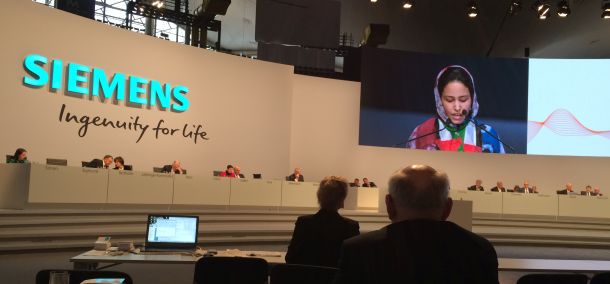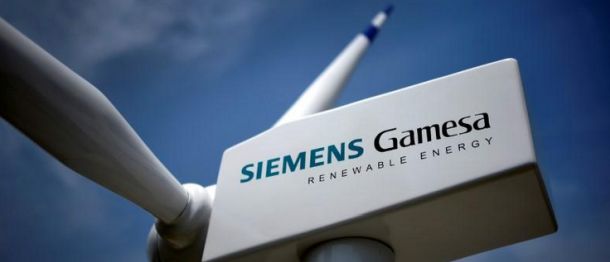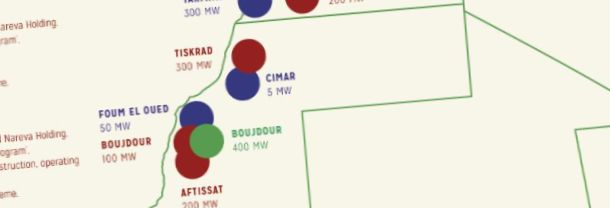
This week's annual meeting of Siemens Energy's shareholders marks ten years of silence from the German group regarding projects on occupied land.
At its Annual General Meeting today, 24 February 2022, Siemens Energy again failed to respond key-questions about its involvement in energy infrastructure projects in occupied Western Sahara.
Siemens Energy has a 67% stake in Siemens Gamesa Renewable Energy (SGRE), which is the main provider of wind turbines to Morocco's wind farms in the territory it has held under military occupation since 1975. Siemens Energy is reportedly considering an all-stock buy-out, thus becoming the full parent company of SGRE within the Siemens structure.
Western Sahara Resource Watch (WSRW) and Kritische Aktionaire had submitted a series of questions to Siemens Energy, focussing on the legal controversies regarding Siemens' activities in Western Sahara, particularly in relation to the internationally recognised right to self-determination of the people of Western Sahara and their right to consent to economic activities on their land. These fundamental rights have been spelled out by different UN Treaty Bodies and in a series of rulings - the latest of 29 September 2021 - by the EU Court of Justice, all stipulating that the territory is separate and distinct from Morocco, and that Morocco has no sovereignty or administering mandate over the territory. The Court stressed the requirement of obtaining the consent of the people of Western Sahara - via their UN recognised representation Polisario Front - in order for any economic arrangement to lawfully affect the territory.
However, this core matter, and most others, were not responded to at all by the Siemens Energy management. In part, this can be a side-effect of COVID-restrictions: ever since AGMs have been held online, companies in Germany have started to lump shareholders' questions together, thereby avoiding to provide detailed responses to each separate question. It also means that the questions presented by a shareholder were never presented to the rest of the shareholders. Overall, however, no company within the Siemens structure has ever answered any questions relating the Saharawi people's rights.
The problematic development of German companies no longer needing to reply to questions from shareholders at AGMs has been allowed by the German federal government.
WSRW has been trying to get answers from different entities in the Siemens structure for 10 years, ever since the firm first announced its plans to participate in the construction of wind farms in the occupied territory. Since 2018, it has taken to these companies' AGMs in the hope of receiving more clarity on crucial issues. To no avail.
Several points stick out in the brief answer provided by Siemens Energy at its AGM of 24 February 2022:
- Siemens Energy claims that its “participation in the construction of a wind farm project does not constitute an act of recognition of the Western Sahara region as part of Moroccan territory”. Western Sahara is not 'a region' - it is a Non-Self-Governing territory without an administering power appointed to it by the UN. As late as in 2020, Siemens Energy's subsidiary SGRE referred to the location of its projects as in “Morocco”.
- Siemens Energy stresses that “this situation requires a political solution, involving governments and not companies”. WSRW agrees. But no one ever asked Siemens to solve the conflict in Western Sahara - only that the firm would stop complicating matters by engaging in infrastructural projects with the occupying power.
- Siemens Energy refers to “valid contracts” that were “concluded with legal effect”. Yet the company will not explain which legal framework in its opinion applies to these contracts.
- Since 2020, and again at this AGM, Siemens refers to an “external report” that supposedly “has confirmed the legality of SGRE's activities in Western Sahara”. The company will not share the name of the authors of the report, nor the document itself - including with shareholders - so as to allow for public scrutiny.
- The company underlines that they provide benefits to the local population. It must be recalled that the ECJ considers this argument irrelevant. Siemens Energy now refers to partnership with two Moroccan NGOs. WSRW has previously written about the controversial High Atlas Foundation, which has a highly pro-Moroccan agenda.
- Siemens Energy avoids the questions about Saharawi consent altogether.
A so-called ‘counter-motion’, urging the entire Board of Siemens Energy to step down, was also presented at the AGM, but did not receive approval.
The Polisario representative in Germany, Nadjat Hamdi, stated the following in a video, circulated before the AGM:
“In my capacity as Polisario representative in Germany, and thus of the Saharawi people, I would like to point out that your economic activities in Moroccan occupied Western Sahara are in violation of international law. For these activities you need our consent. You have never received this consent from us. On the contrary, we reject your activities in our country and condemn them in the strongest possible terms. We therefore ask you to cease all activities.”
There are at present two Moroccan government owned wind farms in occupied Western Sahara that are fully operational. Both of them - 50 MW Foum el Oued and 200 MW Aftissat - are equipped with SGRE's turbines. Both wind farms serve industrial end-users, such as Morocco’s state-owned company OCP’s subsidiary Phosboucraa, which illegally exploits the phosphate reserves of the Non-Self-Governing Territory. In September 2020, SGRE issued a press release on obtaining the contract for the 300-MW Boujdour wind farm, locating it “in the South of Morocco". Boujdour is a town located mid-coast, Western Sahara. In June 2021, SGRE started shipping windmill components from Spain to the occupied territory for this specific farm. Siemens will also provide turbines for the 100 MW Tiskrad farm, expected to be built later this year. Siemens' partner on each of these farms is Nareva: the energy company owned by the king of Morocco.
In 2021, both Siemens Gamesa and Siemens Energy were excluded by Norway's largest private asset manager for contributing to violations of international law in occupied Western Sahara.
In October 2021, WSRW published a report exposing all of Morocco's existing and planned renewable energy projects in occupied Western Sahara. That report, "Greenwashing Occupation", had estimated that energy produced from wind in the territory could constitute 47.20% of Morocco's total wind capacity by 2030. However, shortly after the report's publication, the news emerged that the energy firm of Morocco's prime Minister was planning to build yet another wind farm in the territory, potentially raising Western Sahara's share in Morocco's total wind energy production to 52.25% by 2030.
Since you're here....
WSRW’s work is being read and used more than ever. We work totally independently and to a large extent voluntarily. Our work takes time, dedication and diligence. But we do it because we believe it matters – and we hope you do too. We look for more monthly donors to support our work. If you'd like to contribute to our work – 3€, 5€, 8€ monthly… what you can spare – the future of WSRW would be much more secure. You can set up a monthly donation to WSRW quickly here.
Siemens again refuses to answer questions about Western Sahara at AGM
For the fourth consecutive year, the German engineering company dodges questions at its Annual Shareholders Meeting as to whether it has obtained the consent of the people of Western Sahara to operate on their land.
Siemens fails to respond Western Sahara question at AGM
Why did you not seek permission from my people?, a Saharawi refugee asked at Siemens AGM. Company fails to answer questions why it operates on occupied land.
Siemens: the Moroccan king's wind turbine supplier in Western Sahara
WSRW has again asked Siemens to clarify how they’ve obtained the consent of the people of Western Sahara to their involvement in literally all of Morocco’s wind power plans in the occupied territory.
Moroccan wind energy in occupied Western Sahara passing 40%
Even more wind farms are being planned in occupied Western Sahara, and all of them are in the portfolio of the Moroccan monarch's company NAREVA.



